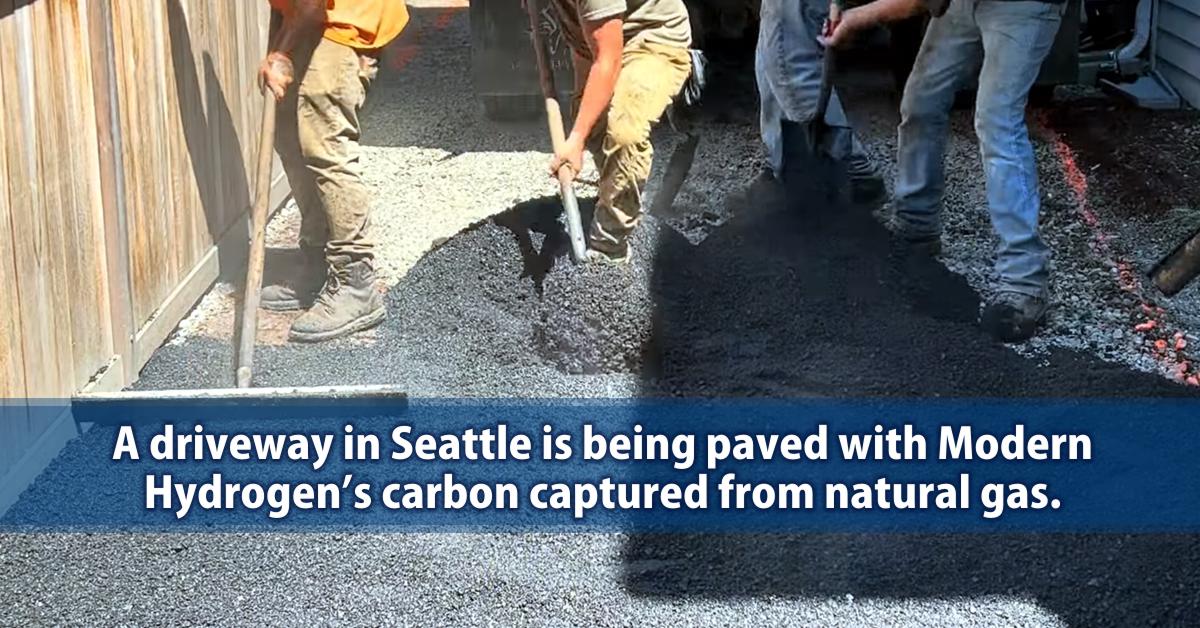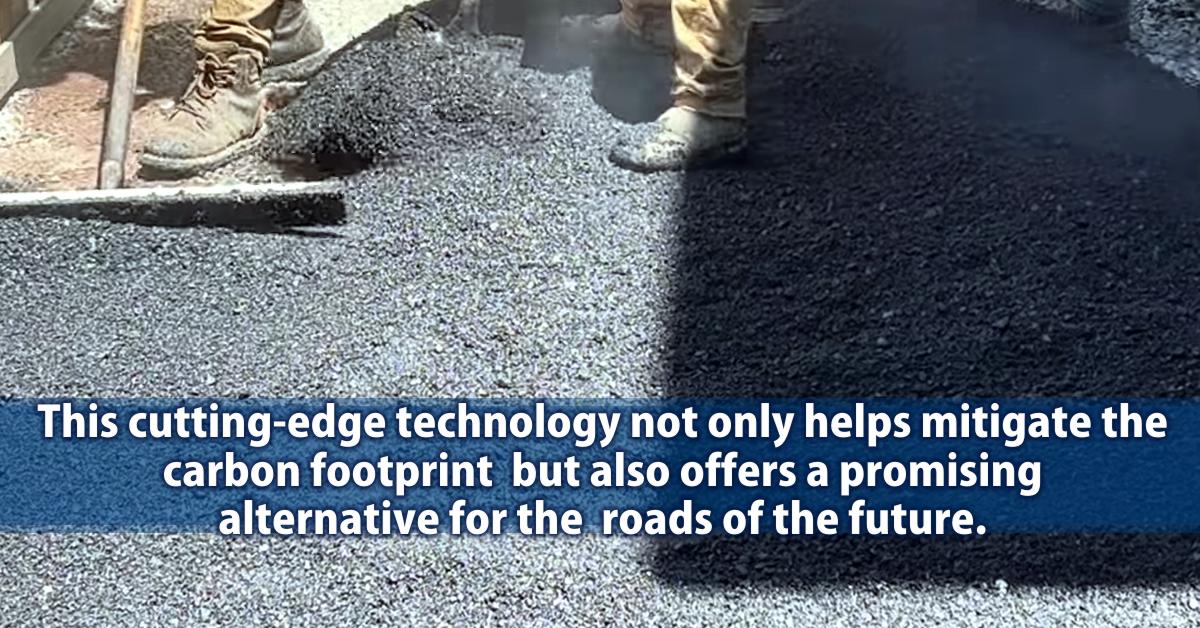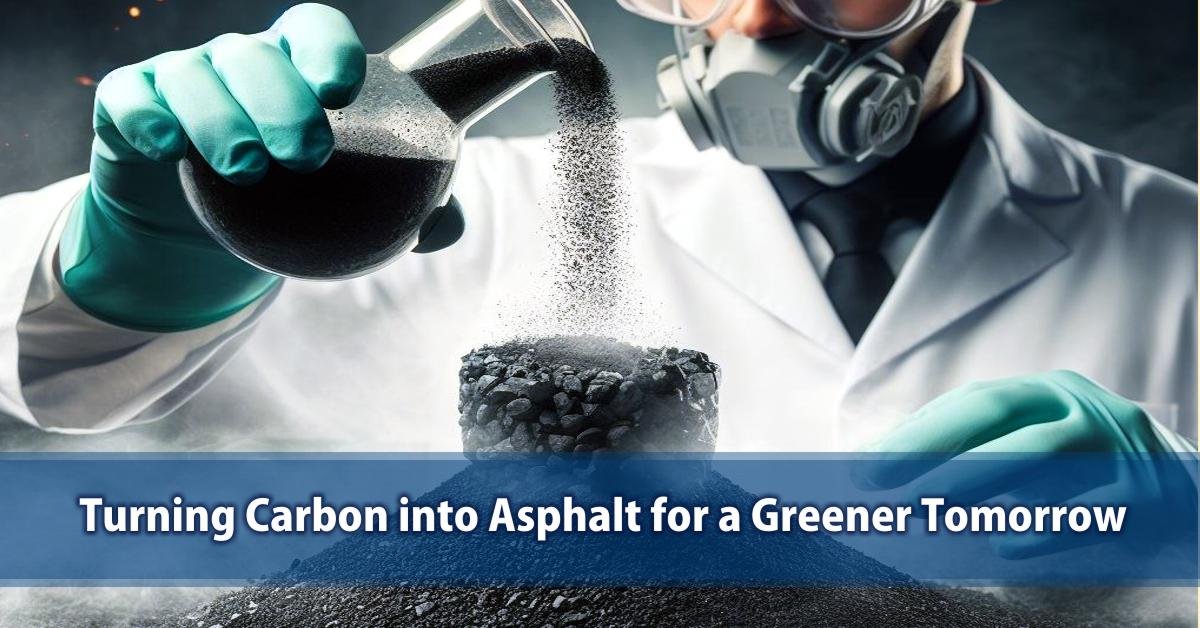NEWS: Modern Hydrogen, a forward-thinking company, is pioneering the use of carbon captured from natural gas to create sustainable asphalt for road construction. This innovative technology offers a promising solution to reduce carbon emissions and revolutionize the road-building industry. Discover how Modern Hydrogen is turning carbon into asphalt for a greener and more eco-friendly future.
What You Need to Know About Modern Hydrogen’s Innovation
Before Getting Into Road Construction:
- Modern Hydrogen’s technology captures carbon from natural gas to create carbon-captured asphalt.
- This asphalt is environmentally friendly and meets existing requirements while being more durable.
Making the Decision:
- Road Recyclers is set to be the first to incorporate carbon-captured asphalt in public roads, which can lead to a significant reduction in carbon emissions.
- Using carbon-captured asphalt supports sustainability and mitigates the carbon footprint of road construction.
Things to Know:
- Modern Hydrogen’s innovative process uses a uniquely clean combustion method to separate carbon and hydrogen.
- The solid carbon byproduct can also be used in concrete and rubber, offering a versatile and sustainable solution.
Facts about Modern Hydrogen’s Innovation
- Modern Hydrogen’s groundbreaking technology captures carbon from natural gas to create eco-friendly asphalt.
- Carbon-captured asphalt has been successfully used in multiple locations in the United States and Canada.
- Road Recyclers is partnering with Modern Hydrogen to incorporate this technology into public roads.
- One-third of U.S. carbon dioxide emissions come from burning natural gas for heat and electricity.
- The process not only captures carbon but also produces clean hydrogen for various applications.

My Analysis Of Turning Carbon into Asphalt for a Greener Tomorrow
As a civil engineer with decades of asphalt paving experience, I’m always seeking more sustainable technologies. An exciting innovation is processes that turn carbon emissions into asphalt binders for paving mixes. Converting a greenhouse gas into a usable construction product is a potential win for both the climate and infrastructure. On my website calculatorasphalt.com, I want to provide insights into this greener asphalt technology.
The Carbon Impact of Asphalt Paving
Traditional hot mix asphalt (HMA) relies on fossil fuel-derived binders from crude oil refining such as paving grade asphalts, cutback asphalts, and emulsified asphalts. The production and construction of asphalt paving are estimated to account for approximately 5% of global carbon dioxide emissions from human activities.
With asphalt pavement covering over 93% of paved roads in the U.S. and 4 million miles of roads worldwide, the carbon footprint of asphalt is substantial. Any sustainable technologies that can lower the greenhouse gas emissions related to asphalt materials would provide significant environmental benefits.
Capturing Wasted Carbon Emissions
A promising approach is using carbon capture technologies to trap the CO2 emissions from industrial facilities before they are released into the atmosphere. This captured carbon can then be converted into useful products rather than remaining pollution.
Sources of captured carbon include:
- Coal or natural gas power plants
- Cement and concrete plants
- Steel mills and iron foundries
- Oil refineries and chemical plants
- Waste-to-energy facilities
After filtering impurities, the captured gaseous CO2 can be catalytically processed into a wide range of value-added products with net zero carbon emissions.
Turning Carbon into Asphalt Binder
One promising application is converting captured carbon into synthetic asphalt binder. Novel technologies are being developed to chemically process waste CO2 into high-quality paving asphalts.
The carbon recycling process to produce asphalt binder typically involves these key steps:
- Capturing carbon-rich flue gas from industrial facilities
- Purifying and concentrating the CO2 gas stream
- Using chemical catalysts to react CO2 with hydrogen under pressure
- Processing the synthesized compounds into liquid asphalt
- Testing and certifying the asphalt binder meets specifications
- Blending the CO2-derived asphalt into conventional paving mixes
This circular process takes a major greenhouse gas emission and transforms it into an essential construction material, reducing the overall carbon impact of asphalt paving.
Asphalt Binder Properties
Independent testing has found the performance properties of asphalt binder derived from captured carbon using these processes meet standard paving grade specifications:
- Viscosity: Similar viscosity-temperature relationship as conventional asphalt
- Flashpoint: >400°F, safely above typical HMA production temperatures
- Solubility: 99% soluble in carbon disulfide
- Durability: Resists aging through heat and oxidation
- Consistency: Stable through freeze-thaw cycles
- Compatibility: Blends seamlessly with conventional asphalt
This table compares the properties of CO2-derived asphalt binder to standard paving grade specifications:
| Property | PG 64-22 Spec | CO2 Asphalt |
|---|---|---|
| Flash Point (°F) | >500 | >400 |
| Rotational Viscosity (cP) | 64-160 | 69 |
The CO2-derived asphalt can serve as a direct replacement for conventional paving asphalt grades like PG 64 in typical hot mix asphalt applications.
Asphalt Mix Performance
In addition to binder testing, hot mix asphalt mixes produced using CO2-based asphalt as a partial replacement for standard paving grades have demonstrated excellent performance:
- Workability: Similar workability during laydown and compaction
- Moisture resistance: Passes modified Lottman test criteria
- Rutting resistance: Comparable to conventional mixes in Hamburg testing
- Fatigue cracking: Equivalent or improved fatigue life
- Thermal cracking: Similar low-temperature fracture properties
- Durability: Resistance to aging meets standard tests
By all metrics, the incorporation of CO2-derived asphalt binder creates HMA mixes with consistent properties and performance compared to conventional plant-produced asphalt.
Environmental Benefits Analysis
Independent life cycle assessments of CO2-to-asphalt processes have validated significant potential environmental benefits:
- Carbon savings: 0.5-1.0 tons of CO2 converted to asphalt for every ton produced
- Lower carbon pavement: 15-30% emission reduction for asphalt mixes using 20-40% captured carbon asphalt
- Energy efficiency: 33% less energy demand than conventional production
- Land use: Much smaller physical footprint than standard asphalt plants
- Air quality: Lower NOx, SOx, particulates than typical hot mix plants
- Sustainability: Enables circular carbon economy using waste emissions
Utilizing captured carbon to produce asphalt binders can make a measurable improvement in the overall carbon footprint of asphalt pavement materials.
Cost Analysis
At present production volumes, the cost to produce CO2-derived asphalt remains higher than standard paving asphalt from crude oil refining. However, as the technology scales up, costs are projected to become competitive:
- Current cost: $600-800 per ton of CO2 asphalt
- Estimated future cost at scale: $350-500 per ton
- Conventional asphalt cost range: $250-400 per ton
With expected improvements, CO2 asphalt costs reaching $400-450 per ton would allow competitive pricing with conventional asphalt binders. This would facilitate mainstream adoption in paving projects.
Implementation Strategies for Turning Carbon into Asphalt
To shift toward greener asphalt binder produced from recycled carbon, strategic approaches include:
- Partnerships – Collaboration between CO2 producers, asphalt companies, and contractors to develop supply chains.
- Performance testing – Comprehensive lab and field testing to fully validate mix properties.
- Specifications – Developing standards and specifications for carbon-derived asphalt materials.
- Financial incentives – Grants, tax credits, and subsidies to help offset higher initial costs.
- Scaling production – Expanding manufacturing capacity to supply higher volumes cost-competitively.
- Sustainability commitments – Levels of CO2 asphalt usage can help meet carbon reduction goals.
With strategic efforts, utilizing waste carbon emissions to create asphalt for paving could grow from a novel concept into a standard industry practice.
Opportunities for Broader Use
If CO2-to-asphalt technology continues to scale successfully, this circular carbon model could potentially be applied to other asphalt products:
- Warm mix asphalt binders
- Asphalt emulsions
- Cutback asphalts
- Asphalt shingles
- Joint sealants
- Caulks/coatings
- Roofing asphalts
The environmental benefits would multiply further with the expanded usage of asphalt materials.
Looking to the Future
As a civil engineer focused on sustainable infrastructure, I’m excited by the possibilities of converting carbon into asphalt binder. With continued technology advancements and strategic partnerships, CO2-derived asphalt could play a meaningful role in building greener asphalt pavements and reducing the impacts of climate change.
Capturing waste carbon emissions for synthesis into usable materials is the type of systems-level solution that will define the circular carbon economy of the future. To learn more about sustainable asphalt and concrete technologies, explore the resources on my website calculatorasphalt.com. Please reach out with any questions!
Steve Axton, PE
Licensed Civil Engineer
How does Modern Hydrogen capture carbon from natural gas for road construction?
Modern Hydrogen utilizes a process called methane pyrolysis, which extracts clean hydrogen from methane while capturing the carbon from that gas before it enters the atmosphere. Methane, the largest component of natural gas, is comprised of four parts hydrogen and one part carbon. The captured carbon takes the form of a solid byproduct known as “carbon black,” which can be used as a binder in hot-mix asphalt, cold patch, and asphalt sealers.
What are the environmental benefits of using carbon-captured asphalt in roads?
The carbon-captured asphalt has already made its mark in various locations, from sealing asphalt parking lots in Portland, Oregon, to paving driveways with hot-mix asphalt in Seattle. It has been utilized in private parking lots and driveways in California, New Mexico, Florida, and even in Alberta, Canada. This innovative approach addresses a pressing environmental concern, as one-third of U.S. carbon dioxide emissions result from burning natural gas for heat and electricity.
How is Road Recyclers contributing to this sustainability initiative?
Road Recyclers, a prominent designer of asphalt binders for road recycling, has partnered with Modern Hydrogen to be the first to incorporate carbon-stripped natural gas into public roads. They have tested Modern Hydrogen’s products and are ready to begin field trials with municipal and state transportation agencies, signifying a significant step towards sustainability in the road construction industry.
What impact does carbon capture have on reducing carbon dioxide emissions?
Modern Hydrogen has developed a system to remove carbon from natural gas at the meter for commercial and industrial operations before it is burned and produces carbon dioxide that enters the air. This process utilizes a uniquely clean combustion method with an onsite hydrogen generator to separate carbon and hydrogen, leaving behind clean hydrogen for various applications. Importantly, no new pipes, electrical connections, or onsite storage are required.

How versatile is the solid carbon byproduct in construction applications?
The carbon capture process yields solid carbon and water vapor as byproducts. This solid carbon can be recycled into asphalt and is versatile enough to be used in concrete and rubber. Modern Hydrogen asserts that the low-carbon asphalt not only meets existing requirements at a low cost but also boasts enhanced durability.
In summary, Modern Hydrogen’s innovative approach to using carbon-captured asphalt in road construction presents a sustainable solution that addresses environmental concerns, reduces carbon emissions, and offers versatility in construction applications.
